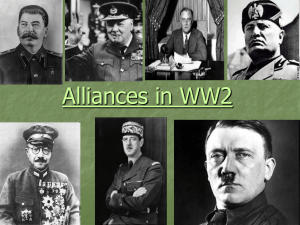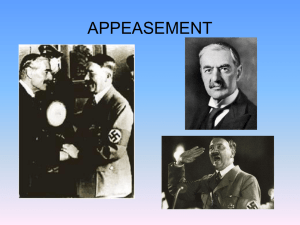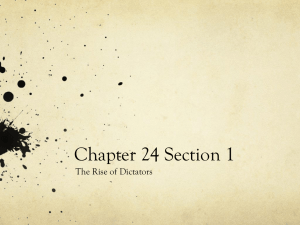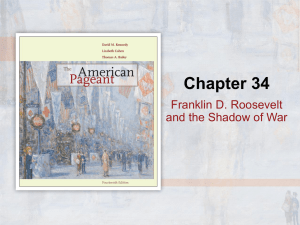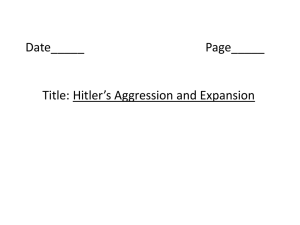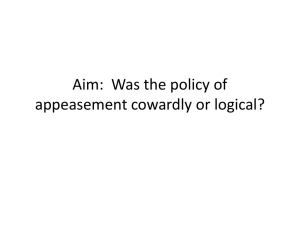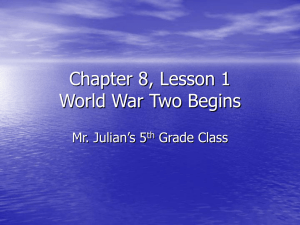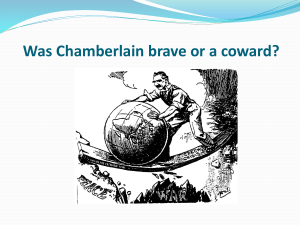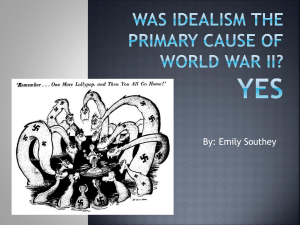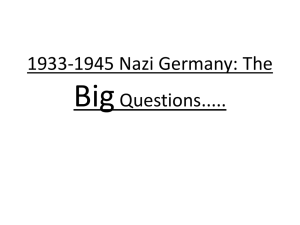Sources for questions on WW2
advertisement
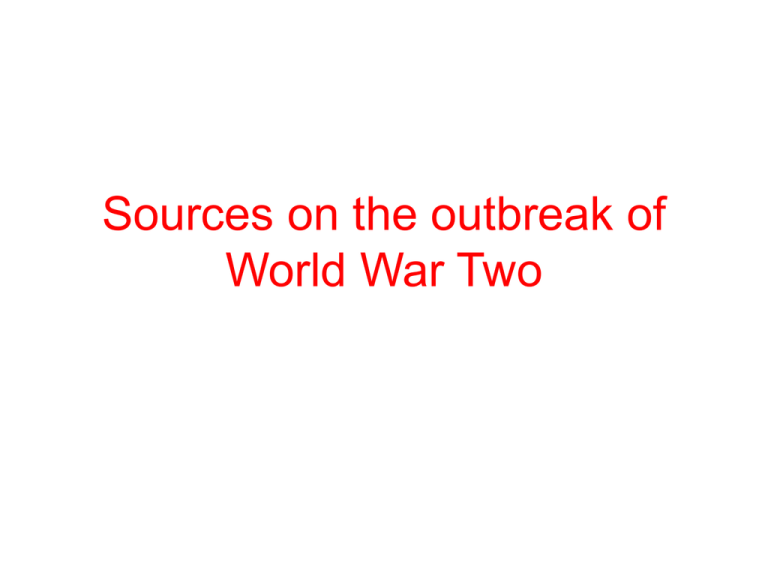
Sources on the outbreak of World War Two Hitler,leader of Nazi Germany Stalin, leader of communist USSR Darkness, death and destruction. Sarcastic greetings, they don’t like each other but pretend to be polite. Dead body to Rendevous represent Poland Meeting place In August 1939 the world was shocked when Nazi Germany signed a nonaggression pact with their avowed enemy, communist Russia. They were declared enemies but reached an agreement not to fight each other, but also to divide Poland between them. Stalin, leader of USSR Guns hidden behind backs, don’t trust each other Legs tied together, represents the NaziSoviet Pact Hitler, leader of Nazi Germany Smiles, arms round each other, flowers, every thing is rosy. Oil – Hitler’s main aim? fields Shared border after Poland divided between them Caption suggests one of them is misleading the other. Cartoonists suggests that the Nazi-Soviet Pact is temporary- but who is tricking who? Has Hitler avoided a war on two fronts? Hitler, dressed as Santa. Children representing former friends of Britain and France being bundled into the sack Suggest the order in which these countries will be taken over Germany over everything The cartoonist suggests that Hitler is easily picking off countries one by one. They are shown as small innocent victims. No-one is standing up to Hitler and Britain and France are doing nothing to protect their former friends. It suggests that Hitler is going to take over all of Europe The caption echoes British complacency suggesting it is not their problem Britain is the last one in line, if they fall, the British Empire represented by the eggs in the basket will be destroyed. Austria will be the first victim followed by Czechoslovakia German military power The hand of Hitler applying pressure on Austria. The cartoonist is suggesting that once Austria falls victim to Hitler’s pressure then the rest will fall like dominoes. The cartoonist also warns Britain and France about their reluctance to intervene suggesting terrible consequences if they don’t. Six months later Chamberlain commented, “How horrible, fantastic, incredible it is that we should be digging trenches and trying on gas masks here because of a quarrel in a far-away country between people of whom we know nothing.” Daladier Signpost suggesting choice of directions (France) WESTERN EUROPE USSR Hitler in the Nazi war machine Neville Chamberlain (Britain) Weapons suggesting ready for war This Russian cartoon after the Munich Agreement in September 1938 suggest that Britain and France were diverting Hitler towards Eastern Europe to protect themselves from the Nazi war machine. It implies Britain and France hoped to benefit from a war between the USSR and Nazi Germany. John Bull representing the British public Neville Chamberlain on his return from the Munich Conference Mediator, or negotiator, suggesting Chamberlain had skillfully used his diplomatic skills to avoid war. Trenches which had been dug in case of the outbreak of war. Gas mask, another precaution taken in the event of war Suggest that Chamberlain has tirelessly worked for peace The cartoonists suggests that the country should be grateful for the personal efforts of Chamberlain who has avoided a war over the Sudetenland, appeasement is seen as a triumph. Olive branch representing a peace offering Goose step,a style of marching by the German army. Claims to have made a mistake – contradicted by map Nazi flags showing support for Hiler in the Rhineland Weapons showing Germany has rearmed. Peace Treaty that has been ripped up and ignored. The cartoonist suggests Germany cannot be trusted, they offer peace but carry a lot of weapons, they ignore peace treaties and you cannot trust their words It implies Hitler is not reasonable and is preparing for war. Adolf Hitler speaking about the remilitarisation of the Rhineland “The forty-eight hours after the march into the Rhineland were the most nerveracking of my life. If the French had then marched into the Rhineland we would have had to withdraw in disgrace, for the military resources at our disposal would have been inadequate for even modest resistance.” A conversation between Rauschning and Hitler in 1934. the two men spent a lot of time together between 1932 and 1934. Rauschning; “Do you seriously intend to fight the west?” Hitler; “What else do you think we are arming for? We must proceed step by step, so that no-one will interfere with our advance. How do we do this I don’t know yet. But that it will be done is guaranteed by Britain’s lack of firmness and France’s internal disunity.” Chamberlain’s radio broadcast before the Munich Conference in September 1938 “How horrible, fantastic, incredible it is that we should be digging trenches and trying on gas masks here because of a quarrel in a far away country between people of whom we know nothing.” Winston Churchill speaking in Parliament in the debate on the Munich Agreement in October 1938. “I will begin by saying the most unpopular and most unwelcome thing: we have suffered a total and unmitigated defeat. I think that, in the future, Czechoslovakia cannot remain independent. You will see that shortly, Czechoslovakia will be taken over by Germany.” Article from the Times newspaper on Chamberlain after the Munich Agreement “Applause for Mr. Chamberlain. No conqueror returning from a victory on the battlefield had come decorated with nobler laurels.” A Soviet historian, A.O. Chubaryan, writing about the Munich Agreement, in a book Anti-Soviet Conspiracy in 1969 “The governments of Great Britain and France wanted to direct German aggression towards the east, to satisfy Hitler’s claims at the expense of the East European countries. They feared the increase of Germany’s strength in Europe, but they hoped to appease Hitler by giving him some Czech territory, and counted on involving Germany and Russia in conflict, thus weakening them both.” A comment made by Lord Lothian in 1936 about the remilitarisation the Rhineland. He was a senior adviser to the British government. “The Germans are, after all, only going into their own back garden.” From Mein Kampf, written by Adolf Hitler in 1924. “We demand equality of rights for the German people in its dealings with other nations. We demand the abolition of the Treaty of Versailles” An extract from the Nazi-Soviet Pact, published in August 1939. “The governments of Germany and the USSR, aiming to strengthen the peace between them, have agreed that they will not attack each other, either alone or with other countries.”


